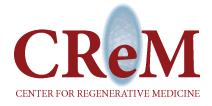Center for Regenerative Medicine to Create First Open Access Lung Stem Cell Repository
 The BU/BMC Center for Regenerative Medicine (CReM) has been awarded a grant to establish the first-of-its-kind stem cell repository that researchers across the country can access for free.
The BU/BMC Center for Regenerative Medicine (CReM) has been awarded a grant to establish the first-of-its-kind stem cell repository that researchers across the country can access for free.
The five-year $2.7 million federal grant from the National Heart, Lung, and Blood Institute (NHLBI) will help expand and grow stem cell research aimed at developing treatment for diseases affecting the lungs.
CReM’s pioneering research using Induced Pluripotent Stem Cells (iPSCs), which self-renew indefinitely as undifferentiated cells that become specific adult cell types, has helped create an inexhaustible source of disease or patient-specific stem cells. Researchers use these cells to construct disease models in a lab and test potential treatments for a variety of diseases – all without limits that are currently in place for embryonic stem cell research.
The Repository, to be housed at CReM’s laboratory on the Medical Campus, will provide access to iPSCs from patients with both normal and diseased lungs. The cells will be expanded, frozen and shipped to investigators who request them to use in their own laboratories.
The grant also will allow CReM investigators to provide training courses on the different methodologies for the generation and maintenance of iPSCs and the proven techniques to differentiate them into adult lung cells. “This grant will support the widest possible sharing of our cells with the national research community and should provide the most rapid possible path for a national collaboration to develop new disease treatments using this state-of-the-art technology,” said Darrell Kotton, MD, director of the CReM who will serve as the co-Principal Investigator (PI) of this project. “We feel strongly about the power of collaboration, and that through our center’s ‘Open Source Biology’ philosophy, we can advance science to heal the world. This grant will help us do just that.”
“This resource will facilitate lung research by making available human cells for modeling lung health and disease,” said James P. Kiley, PhD, director, Division of Lung Diseases, NHLBI.
Diseases affecting the lung, including emphysema, cystic fibrosis, acute respiratory distress syndrome and pulmonary fibrosis, cause considerable morbidity and mortality in the US today, yet there are few therapeutic options available. These limited options are due, in part, to limited access to an available supply of primary human lung cells, or lung progenitors, for biomedical research.
“We are thrilled to receive this grant from the NHLBI,” said Gustavo Mostoslavsky, MD, PhD, the project’s other co-PI and co-director of CReM. “The grant will help promote collaboration among researchers in the field and will help pave the way to the development of newer, better treatments for diseases of the lung.”
Funding for this study is provided in part by the National Institutes of Health’s NHLBI under grant award number 1R24HL123828-01.